Events
News
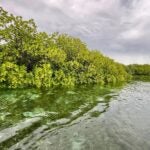 Mangrove as metaphor: Adaptable plant offers inspiration for a new model for sustainable food systems July 16, 2025 - Professor Patrick Baur’s research focuses on equitably and sustainably balancing human livelihoods and ecosystems through improving how food is produced, distributed, and eaten. He works at the intersection of environmental science and public policy and co-authored a recent paper in the journal Nature Food.
Mangrove as metaphor: Adaptable plant offers inspiration for a new model for sustainable food systems July 16, 2025 - Professor Patrick Baur’s research focuses on equitably and sustainably balancing human livelihoods and ecosystems through improving how food is produced, distributed, and eaten. He works at the intersection of environmental science and public policy and co-authored a recent paper in the journal Nature Food. Growing Smarter: Rethinking Sustainability in Controlled Environment Agriculture July 15, 2025 - Sheriff Aliu, a Ph.D. candidate in Sustainable Agriculture and Food Systems working in URI’s Baur Food Systems Lab, researches sustainability and equity assessment for commercial Controlled Environment Agriculture operations.
Growing Smarter: Rethinking Sustainability in Controlled Environment Agriculture July 15, 2025 - Sheriff Aliu, a Ph.D. candidate in Sustainable Agriculture and Food Systems working in URI’s Baur Food Systems Lab, researches sustainability and equity assessment for commercial Controlled Environment Agriculture operations. Fellowship Spotlight: Carli Romano on Shoreline Access in Rhode Island July 10, 2025 - As part of a CELS Summer Research Fellowship, marine affairs and political science double major Carli Romano is working with Professors Melva Treviño Peña and Jesse Reiblich on coastal access policy research in Rhode Island.
Fellowship Spotlight: Carli Romano on Shoreline Access in Rhode Island July 10, 2025 - As part of a CELS Summer Research Fellowship, marine affairs and political science double major Carli Romano is working with Professors Melva Treviño Peña and Jesse Reiblich on coastal access policy research in Rhode Island. 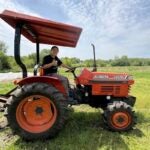 “Doing to Learn”: Fellowship Connects Students with Food System Work July 8, 2025 - From farming to research, students in the Rhode Island Agriculture and Food Systems Fellows Program offered through URI’s Cooperative Extension are spending their summers immersed in the local food system.
“Doing to Learn”: Fellowship Connects Students with Food System Work July 8, 2025 - From farming to research, students in the Rhode Island Agriculture and Food Systems Fellows Program offered through URI’s Cooperative Extension are spending their summers immersed in the local food system.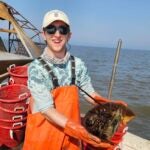 Nick O’Connor on Marine Science Research Experiences July 2, 2025 - Nick O’Connor, a marine biology and aquaculture and fisheries science double major, is participating in the NSF Research Experiences for Undergraduates program this summer at Rutgers University's Haskin Shellfish Research Laboratory. He is conducting research using camera-mounted fish traps to study fish distributions around artificial reefs off the Jersey shore.
Nick O’Connor on Marine Science Research Experiences July 2, 2025 - Nick O’Connor, a marine biology and aquaculture and fisheries science double major, is participating in the NSF Research Experiences for Undergraduates program this summer at Rutgers University's Haskin Shellfish Research Laboratory. He is conducting research using camera-mounted fish traps to study fish distributions around artificial reefs off the Jersey shore. 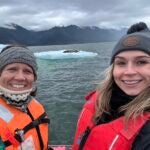 The leopard seal in focus June 27, 2025 - While leopard seals might be easily recognized for their ominous portrayals as villains in movies, they largely remain a mystery to humans. Professor Sarah Kienle and postdoctoral researcher Emily Sperou are working to fix that by contributing to our scientific understanding of these marine apex predators.
The leopard seal in focus June 27, 2025 - While leopard seals might be easily recognized for their ominous portrayals as villains in movies, they largely remain a mystery to humans. Professor Sarah Kienle and postdoctoral researcher Emily Sperou are working to fix that by contributing to our scientific understanding of these marine apex predators.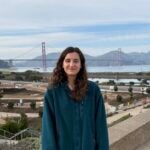 Applications of GIS: Meagan Shanaghan on the Development of URI Botanical Collections Database June 25, 2025 - At URI, GIS is used to manage the impressive botanical collections on the Kingston Campus. What started as a need for better organization of the accessions database – a spreadsheet that tracked the inventory of plants housed on campus – grew into an interactive tool used by both staff and visitors alike: URI Botanical Collections Database. The leading developer for the database was GIS and spatial services specialist Meagan Shanaghan ‘20 M.E.S.M. ‘23.
Applications of GIS: Meagan Shanaghan on the Development of URI Botanical Collections Database June 25, 2025 - At URI, GIS is used to manage the impressive botanical collections on the Kingston Campus. What started as a need for better organization of the accessions database – a spreadsheet that tracked the inventory of plants housed on campus – grew into an interactive tool used by both staff and visitors alike: URI Botanical Collections Database. The leading developer for the database was GIS and spatial services specialist Meagan Shanaghan ‘20 M.E.S.M. ‘23.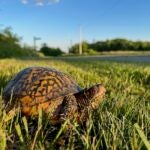 Leave no trace: Careful social media sharing can help protect local reptiles and amphibians June 24, 2025 - Compared to other New England states, there is less turtle density in Rhode Island due to the state’s urbanization. However, careful driving, and media use, are still recommended to help protect turtles and other vulnerable reptile and amphibian species.
Leave no trace: Careful social media sharing can help protect local reptiles and amphibians June 24, 2025 - Compared to other New England states, there is less turtle density in Rhode Island due to the state’s urbanization. However, careful driving, and media use, are still recommended to help protect turtles and other vulnerable reptile and amphibian species.
